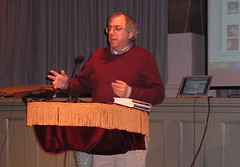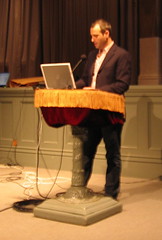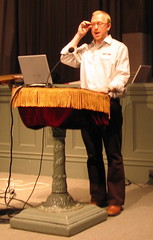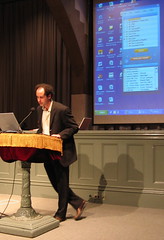Holiday Startups at the December 2006 NY Tech Meetup
 Steven Levy kicked things off with some reminiscences from his 2001 book “Hackers: Heroes of the Computer Revolution”. The book traces the PC revolution to its origins in the model railroad club at MIT, and he also touched on the Homebrew Computer Club, portraying it as a direct inspiration for events like the NY Tech Meetup, where geeks would show off their new toys and network. In an amusing anecdote, he told of the first program homebrew wrote for the Altair, enabling the computer to play the song Daisy by manipulating feedback through a radio (Altair had no internal sound). He then discussed his new book “The Perfect Thing” which covers the design and launch of the iPod along with its subsequent success. In keeping with one of the iPod’s signature features, the book comes in four versions with identical chapters but, apart from Chapter 1, the other chapters are all shuffled in different orders across the four versions.
Steven Levy kicked things off with some reminiscences from his 2001 book “Hackers: Heroes of the Computer Revolution”. The book traces the PC revolution to its origins in the model railroad club at MIT, and he also touched on the Homebrew Computer Club, portraying it as a direct inspiration for events like the NY Tech Meetup, where geeks would show off their new toys and network. In an amusing anecdote, he told of the first program homebrew wrote for the Altair, enabling the computer to play the song Daisy by manipulating feedback through a radio (Altair had no internal sound). He then discussed his new book “The Perfect Thing” which covers the design and launch of the iPod along with its subsequent success. In keeping with one of the iPod’s signature features, the book comes in four versions with identical chapters but, apart from Chapter 1, the other chapters are all shuffled in different orders across the four versions.
Steven was asked about the Zune in the Q&A and commented on the crippled wifi that shares songs but only gives “3 days or 3 plays” and said the Zune should have launched with the ability to detect playlists over wifi. He thinks it will be a contender eventually but that “right now the Zune is a non-starter.” As for the iPhone, he thinks it’s for real and believes Apple will rethink the phone in the same way the iPod rethought the MP3 player.
 Next up was Steve Spurgat, founder of Urbis, a feedback, social-networking and freelance employment community for content creators. Writers is the only launched category to date, but Steve said Video and Audio would be coming soon. Urbis lets you post content, define who can review your content, get feedback, and set goals for your content (ex. “make children laugh”). He claimed 12,000 registered users with a monthly activity rate of 13%, 2 published writers and an imminent deal with Harper Collins to offer concrete publishing opportunities to Urbis members.
Next up was Steve Spurgat, founder of Urbis, a feedback, social-networking and freelance employment community for content creators. Writers is the only launched category to date, but Steve said Video and Audio would be coming soon. Urbis lets you post content, define who can review your content, get feedback, and set goals for your content (ex. “make children laugh”). He claimed 12,000 registered users with a monthly activity rate of 13%, 2 published writers and an imminent deal with Harper Collins to offer concrete publishing opportunities to Urbis members.
Steve was asked how he differentiates urbis from trigger street. He said the screenplay ranking site, founded by Kevin Spacey, is more of a pass/fail environment, where as urbis offers many more metrics for evaluating content and in urbis “the reviewers are also being reviewed,” allowing artists to evaluate the quality of their feedback as well. He was also asked if urbis would be used to test advertising copy against target demos, and he replied that ad agencies were “expressing interest” in the site.
 Scott Kolber from Linkstorm presented his onsite drop-down/drill-down technology for deep linking related content from publishers or in online advertising. The technology was developed by TCP/IP inventor Robert Kahn. Kolber highlighted Linkstorm’s ability to “control links remotely from a central point, without specific knowledge of where the links are deployed.” He claimed the technology generates increased direct response rates from advertising with “unfurling [rolling over the ad to initiate the drop-down list] rates as high as 23% and CTRs on unfurled ads as high as 40%.”
Scott Kolber from Linkstorm presented his onsite drop-down/drill-down technology for deep linking related content from publishers or in online advertising. The technology was developed by TCP/IP inventor Robert Kahn. Kolber highlighted Linkstorm’s ability to “control links remotely from a central point, without specific knowledge of where the links are deployed.” He claimed the technology generates increased direct response rates from advertising with “unfurling [rolling over the ad to initiate the drop-down list] rates as high as 23% and CTRs on unfurled ads as high as 40%.”
Scott was asked why their technology could not just be replicated by the publisher on-page using dynamic HTML, and replied that the centralised control for deployment on a large publisher’s site or in a distributed advertising campaign was the value added by linkstorm.
 Cogmap is a wiki for company org charts, a “B2B UGC play.” The founder, Brent Halliburton, is out to disintermediate B2B direct mailing, which he pegged as a $2 Billion per year industry.
Cogmap is a wiki for company org charts, a “B2B UGC play.” The founder, Brent Halliburton, is out to disintermediate B2B direct mailing, which he pegged as a $2 Billion per year industry.
When asked what contributors ultimately get out of building this tool, Brent replied “I don’t know.” But he said the site will hopefully provide you a large return for a relatively small amount of effort on the part of any individual user. An audience member suggested charging sales people a fee to swap leads with other sales people as one way in which the site might monetize its content.
 David Fishman presented uPlayMe, a P2P client that matches your music playlists with other users on the system to generate new song recommendations and do the virtual friend thing with like content consumers. The current version works only for music but future versions will include video, gaming and ebooks. David also said that a deal with an internet dating site to use their media matching technology was in it’s “final throes.”
David Fishman presented uPlayMe, a P2P client that matches your music playlists with other users on the system to generate new song recommendations and do the virtual friend thing with like content consumers. The current version works only for music but future versions will include video, gaming and ebooks. David also said that a deal with an internet dating site to use their media matching technology was in it’s “final throes.”
Finally, Jed Katz of DFJ Gotham said the firm would most likely be debuting a seed capital fund in 2007, which seemed to be well-received by the audience. He was then asked how many NY Tech Meetup companies DFJ has invested in, and gave a diplomatic reply that translated to “none.” Wilson-Sonsini’s Adam Denau finished things up with a plug for their entrepreneur’s college, with a Term Sheets class December 13th and a reset presenting the entire curriculum again starting in April 2007.
Jonah Keegan is an entrepreneur with a business, a blog and a few other things.


Reader Comments